May 16, 2011
By Betzy Franz
Ten things you can do right now to help preserve fish and wildlife habitat in Florida.
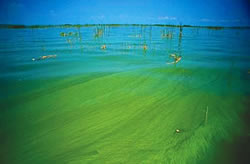
Florida's lakes and bays are increasingly vulnerable to harmful algae blooms. Cutting back on fertilizer use in one way to help.
|
What do washing our cars, mowing our lawns and walking our dogs have to do with fishing and hunting in Florida? Besides cutting into our leisure time, the way we carry out these daily chores and others can have a profound impact on fish and game habitat.
With Florida continuing to add over 300,000 new residents every year, never has it been more important for sportsmen to understand that every action we take in our homes and yards doesn't just affect the birds and butterflies that visit it, but the state's other wildlife, as well.
There are many things we can do to improve the environment for fish and game. Here are ten we can do in our own backyards:
1) Watch what goes into the groundwater—Everything that goes into the ground on our property has the potential of finding its way into Florida's waterways. Stormwater runoff is a leading cause of water pollution. One good example is the substances we use in the care and maintenance of our boats. Products which contain toxic ingredients such as chlorine, phosphates or ammonia can dry the natural oil that fish need for their gills to take in oxygen.
Power plants kill billions of fish egs and larvae. |
|
To reduce the need for toxic products, rinse your boat with fresh water after each use. For heavier cleaning, use old-fashioned cleaning methods including baking soda, vinegar, lemon juice and “elbow grease,” or ask your marine supply store for non-toxic cleaning products. It is much safer to do any cleaning over your grass or some other absorbent surface than to allow water to run off onto a paved or hard surface. And always collect any engine oil or other lubricants in an approved container and take it to a designated recycling center.
2) Fertilize with care—Fertilizers contain nutrients that can cause algae blooms in Florida's waterways. An extreme example of this is Lake Apopka, just northwest of Orlando. Years ago, Lake Apopka was so clear, fishermen could actually pick out which bass to catch. After years of fish kills caused by algae blooms Lake Apopka is now considered the most polluted lake in Florida.
Your lawn's nutritional needs can be met without chemical fertilizers by using compost or allowing grass clippings to remain on the lawn. If you do feel the need to apply fertilizer, become familiar with the numbers on your fertilizer label. These numbers represent the amounts of nitrogen, phosphorus and potassium, in that order. Nitrogen helps make plants green and supplies plants with energy to grow, but in waterways it can cause hypoxia, diminishing populations of fish and shellfish. Phosphorus promotes flowering and seed production, which is unnecessary for lawns and causes algae blooms in waterways.
Look for fertilizer that is very low in phosphorus or contains no phosphorus at all (zero for the middle number). Nitrogen should be at least 30% slow-release, water-insoluble nitrogen.
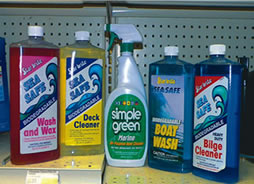
The market for biodegradable boat cleaners is growing.
|
3) Use pesticides sparingly—Earthworms, crickets, grasshoppers and all sorts of insect larvae are popular baits for freshwater fishing in Florida. Yet many people use pesticides that kill these creatures if they show up in their yard. Pesticides not only kill healthy organisms in your yard, but they can make their way into waterways, where they harm fish, plants and other living things.
Keeping a healthy yard is the best defense against insects. Plants that have not been weakened by over-watering and over-fertilization are less vulnerable to harmful insects. Predators such as bigger bugs, toads and birds usually take care of the ones that sneak in.
If you think you have a pest problem, the first thing to do is to identify the insect. Your local County Extension Agents (check the phone book blue pages) can help you identify Florida insects and will be able to recommend the least toxic solution for the specific insect. These include insecticidal soaps, horticultural oils and products containing a bacterium called Bacillus thuringiensis (BT).
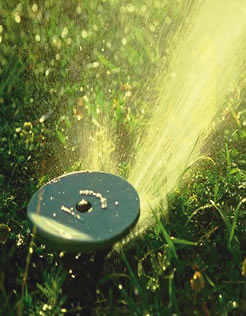
Overwatering threatens lake levels and your lawn.
|
4) Don't waste water—Landscape irrigation is a big waster of groundwater in Florida. Properly managing your irrigation system can save thousands of gallons of water annually and help reduce stormwater runoff. Florida law requires that all irrigation systems installed after May 1, 1991 include an automatic rain sensor shut-off device. Many areas have also enacted watering rules that mandate how often and what hours of the days you can water. Whether you use an in-ground irrigation system or a manual system, you should use a rain gauge to calibrate how much water you are using. Horticultural experts at the University of Florida recommend that you water no more than 1/2- to 3/4-inch twice a week. Over-watering can cause more problems then under-watering, such as dollar weed and fungal growth. Watering less often and more deeply allows a plant to develop deeper, healthier root systems, rather than shallow surface roots.
5) Follow the principle of Right Plant, Right Place—Properly selected plants not only reduce runoff but they also minimize the need for fertilizer, pesticides and irrigation. Native plants are often excellent choices, but following the principles of “right plant, right place” is more important than just choosing native species. For example, if you have dry, sandy soil, choosing plants such as Walter's viburnum or wax myrtle, even though they are Florida natives, would not be a good choice. Since these plants require wet soil, they will either always be unhealthy or you will have to constantly water them. Your local County Extension Agents will be able to help you make the right choices. Also, check out the Florida Native Plant Society; www.fnps.org.
6) Provide wildlife habitat—Landscape your yard with plants that provide food (berries, nuts, etc.) and shelter for birds and other wildlife. The birds, in turn, help control insect populations on your property, eliminating the need for chemical pesticides. Good examples of wildlife-friendly plants are holly trees, oaks, palmettos and southern red cedar. Creating a mini-corridor of thicker, native plants along your property line can provide safe passage for deer, bobcats or other wildlife displaced from natural habitats.
Have your septic system checked every three years. |
|
7) Mow right for a healthy lawn—A healthy lawn protects local waterways by acting as a filter to trap sediment and pollutants. Think less work, not more. Over-watering, over-mowing and over-fertilization weaken a lawn by not forcing it to develop a strong, healthy root system. As with other plants, the best type of grass depends on your site conditions. Keep mower blades sharpened to avoid damaging the grass blades and mow only enough to keep the lawn at a height of 3 1/2 or 4 inches. Never remove more than one third of the grass blade when you mow.
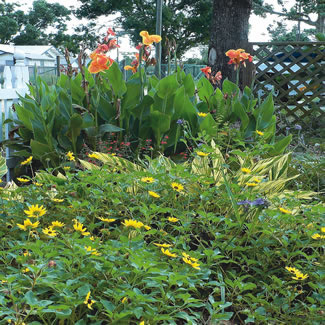
Here are just a few attractive plants requiring little water. In back is canna; in front is scarlet sage, a Florida native. Variegated yellow and green is shell giner; blue flowers are spiderwort (both native). Yellows that predominate are beach sunflower, also native.
|
8) Conserve energy—In Florida, automobiles and electrical utilities are major sources of air pollution and mercury deposition. Coastal power plants also kill billions of fish eggs and larvae in their cooling systems. We can lessen these impacts by conserving energy where possible. One thing to do is keep boats, cars and other combustion engines properly maintained and tuned-up. Cut energy use by easing back on your boat throttle, the gas pedal in your car and the thermostat in your home.
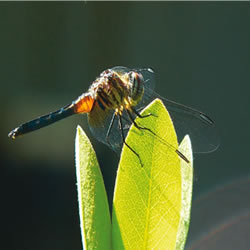
Who needs pesticides when ace bug-killers like dragonflies are on the job?
|
9) Maintain your septic system—If a septic system is not working properly, it loses the ability to remove pollutants and disease-carrying microorganisms from wastewater. Contamination of water bodies by malfunctioning septic systems can pollute water supplies and close shellfish beds and recreational areas. Never dispose of chemicals, grease, cat litter, cigarette butts or other clogging items into your drains. Don't plant large trees or shrubs with spreading roots near your drainfield. Never park your car, boat or other heavy vehicles on your septic field, as these may collapse the drain lines. Have the system checked and cleaned every three years or at the first sign of poor flushing or sluggish drains.
10) Preserve the mangroves—Owners of Florida waterfront property have a higher responsibility to the environment because everything that they put in their yard is going to make its way into the water a lot quicker. Maintaining shoreline plants will help filter these groundwater pollutants. At the same time, you'll contribute to the estuarine food chain, attract wildlife and help prevent shoreline erosion. Mangrove trees are one of the most valuable of these shoreline plants.
The relationship between mangroves and their associated marine life cannot be over-emphasized. Mangroves provide protected areas for young fish, crustaceans and shellfish to mature. They also provide food for many marine species such as snook, snapper, tarpon, jack, sheepshead, red drum, oyster and shrimp. The Florida legislature enacted the 1996 Mangrove Trimming and Preservation Act to ensure the protection of these valuable plants. This law regulates the trimming and alteration of mangroves statewide. Removing mangroves or causing damage or death by improper pruning can result in fines.
Individually and collectively, we can make a huge difference in the protection of Florida's natural and water resources.
FS
